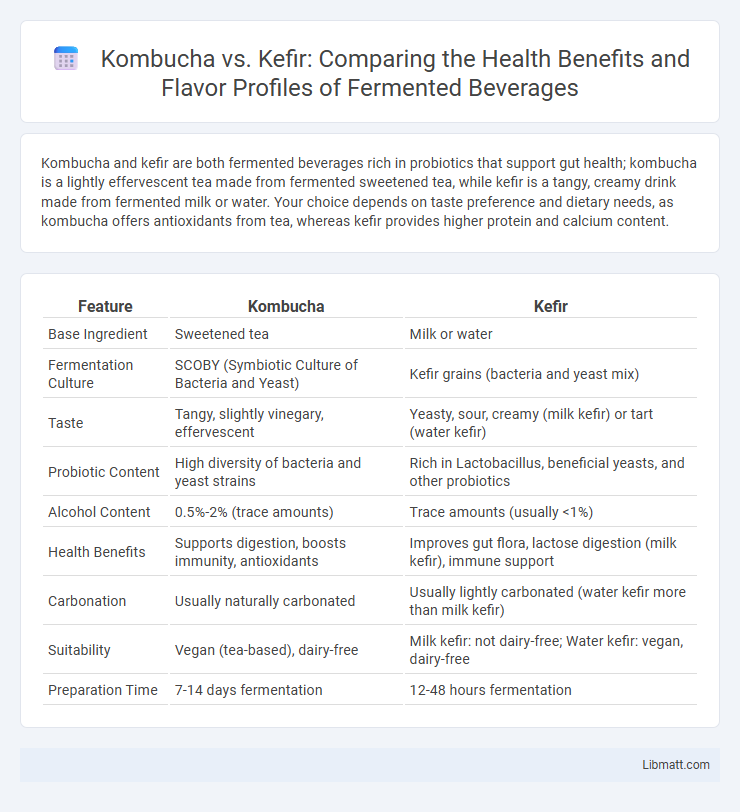Kombucha and kefir are both fermented beverages rich in probiotics that support gut health; kombucha is a lightly effervescent tea made from fermented sweetened tea, while kefir is a tangy, creamy drink made from fermented milk or water. Your choice depends on taste preference and dietary needs, as kombucha offers antioxidants from tea, whereas kefir provides higher protein and calcium content.
Table of Comparison
| Feature | Kombucha | Kefir |
|---|---|---|
| Base Ingredient | Sweetened tea | Milk or water |
| Fermentation Culture | SCOBY (Symbiotic Culture of Bacteria and Yeast) | Kefir grains (bacteria and yeast mix) |
| Taste | Tangy, slightly vinegary, effervescent | Yeasty, sour, creamy (milk kefir) or tart (water kefir) |
| Probiotic Content | High diversity of bacteria and yeast strains | Rich in Lactobacillus, beneficial yeasts, and other probiotics |
| Alcohol Content | 0.5%-2% (trace amounts) | Trace amounts (usually <1%) |
| Health Benefits | Supports digestion, boosts immunity, antioxidants | Improves gut flora, lactose digestion (milk kefir), immune support |
| Carbonation | Usually naturally carbonated | Usually lightly carbonated (water kefir more than milk kefir) |
| Suitability | Vegan (tea-based), dairy-free | Milk kefir: not dairy-free; Water kefir: vegan, dairy-free |
| Preparation Time | 7-14 days fermentation | 12-48 hours fermentation |
Introduction to Kombucha and Kefir
Kombucha is a fermented tea drink rich in probiotics, organic acids, and antioxidants, known for its tangy flavor and potential digestive benefits. Kefir is a fermented milk beverage containing diverse strains of beneficial bacteria and yeast, offering high protein content and aiding gut health. Both kombucha and kefir support digestive wellness through distinct probiotic profiles derived from fermentation.
Origins and History
Kombucha originated over 2,000 years ago in Northeast China, where it was prized for its fermented tea made using a symbiotic culture of bacteria and yeast (SCOBY). Kefir traces its roots to the Caucasus Mountains, where nomadic tribes brewed this fermented milk drink using kefir grains composed of bacteria and yeast for centuries. Understanding these distinct origins provides insight into how your gut health benefits may vary between kombucha's tea base and kefir's dairy composition.
Key Ingredients and Fermentation Process
Kombucha is made from sweetened tea and fermented using a symbiotic culture of bacteria and yeast (SCOBY), which produces a slightly tangy, effervescent drink rich in organic acids and probiotics. Kefir typically involves fermenting milk with a combination of bacteria and yeast contained in kefir grains, resulting in a creamy, probiotic-rich beverage with a distinct tartness and higher protein content. Understanding Your preference for dairy or non-dairy fermentation can guide the choice between kombucha's tea-based probiotic benefits and kefir's dairy-derived nutritional profile.
Nutritional Comparison
Kombucha is rich in antioxidants, B vitamins, and organic acids, promoting digestion and liver health, while kefir contains higher levels of protein, calcium, and probiotics beneficial for gut health and immune function. Kefir typically has a broader spectrum of beneficial bacteria and yeast strains compared to kombucha, contributing to improved microbial diversity in the digestive system. Both beverages offer unique nutritional benefits, with kombucha excelling in antioxidant content and kefir providing superior probiotic density and essential nutrients like calcium.
Probiotic Content and Gut Health Benefits
Kombucha contains a diverse mix of beneficial bacteria and yeast, primarily including Gluconacetobacter and Saccharomyces species, which support gut microbiome diversity and digestion. Kefir boasts a higher probiotic load with over 30 strains of beneficial bacteria and yeasts like Lactobacillus kefiri, promoting stronger immune function and enhanced gut barrier integrity. Both fermented beverages improve digestive health, but kefir's richer probiotic profile offers more potent and sustained gut health benefits.
Flavor Profiles and Varieties
Kombucha offers a tangy, slightly sweet, and effervescent flavor with variations ranging from fruity to herbal infusions, influenced by fermentation time and added ingredients. Kefir presents a creamy, tart, and mildly yeasty taste, often described as a cross between yogurt and buttermilk, with varieties including milk kefir, water kefir, and flavored options with fruit or spices. Both beverages deliver diverse sensory experiences shaped by microbial cultures and fermentation methods, appealing to different palates and dietary preferences.
Health Benefits and Potential Risks
Kombucha and kefir both offer significant health benefits, including gut microbiome support through probiotics, improved digestion, and potential immune system enhancement. Kombucha provides antioxidants and detoxifying compounds from fermented tea, while kefir, a fermented dairy product, contains a broader spectrum of beneficial bacteria and yeast that may aid lactose digestion and reduce inflammation. Your choice should consider potential risks such as kombucha's acidity, which might cause stomach upset, and kefir's dairy content, which could trigger issues for those with lactose intolerance or allergies.
How to Make Kombucha vs. Kefir at Home
To make kombucha at home, brew sweetened tea and ferment it with a SCOBY (symbiotic culture of bacteria and yeast) for 7-14 days, maintaining a temperature of 75-85degF (24-29degC). Kefir preparation involves fermenting milk or water with kefir grains rich in bacteria and yeast at room temperature for 24-48 hours. Both beverages require careful sanitation and proper fermentation times to develop their distinct probiotic properties and flavors.
Common Myths and Misconceptions
Kombucha and kefir are often confused as identical fermented drinks, but kombucha is a fermented tea using a SCOBY, while kefir is a fermented milk or water beverage with kefir grains. A common myth is that both provide the same probiotic benefits; however, kefir contains a broader variety of bacterial strains and yeast, offering more diverse gut flora support. Understanding these differences ensures your probiotic intake aligns with your digestive health goals.
Which is Better: Kombucha or Kefir?
Kefir contains a higher concentration of probiotics and a broader range of beneficial bacteria and yeast strains compared to kombucha, making it more effective for gut health. Kombucha offers antioxidants from fermented tea and may aid in detoxification, but its probiotic diversity is generally lower. For those seeking stronger digestive benefits, kefir is typically considered the better option.
Kombucha vs kefir Infographic

 libmatt.com
libmatt.com